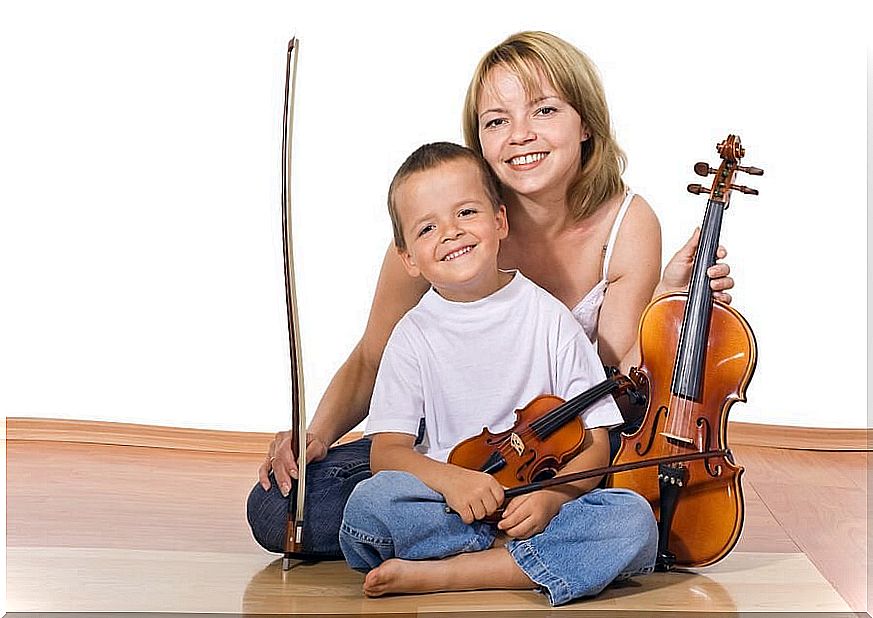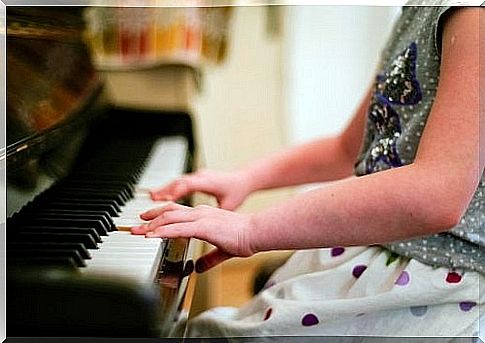Benefits Of Learning To Play An Instrument

Improved concentration during daily activities, stimulation of memory, fine motor development and better hearing. These are just some of the many benefits that your child will have if he or she learns to play an instrument.
Benefits of playing an instrument
The relationship between music, culture and education
Music is one of the most beloved manifestations we know of. Every human society has created and reproduced sounds with instruments and with human voices. By doing this, they express thoughts, ideas and sensory stimuli.
Music is present, every day, in our homes, through all sorts of different sources. For example, television, the Internet, and radio all reproduce music. In fact, many educational games for children involve music. This is because studies have shown that music promotes learning.
Every child feels naturally attracted to music and musical instruments. It should come as no surprise that many children’s toys are small pianos, xylophones, microphones, etc. Thanks to these types of toys, many parents have discovered that their children have a strong inclination towards music.
The benefits of music as a psychological and social tool
Music contributes many psychological and social benefits. One of them is that it gives children the ability to concentrate and meet their educational goals.
Generally, when children play a musical instrument, they end up being part of an orchestra or a musical ensemble. This automatically allows them to socialize with their peers and learn to work together as a team.

Many parents believe that children can only learn about cooperation and strategies by participating in sports. However, the precision needed to make a symphony sound good and in harmony requires strenuous collaboration and practice as a team.
Learning to play an instrument also activates sensitivity to art and culture. They also learn a whole lot about professional development and the correct way to integrate into society.
Examples in different countries
Some institutions in Latin America and Europe have brought the project, developed by José Antonio Abre, to their countries. The project, created in 1975, is called the “National Network of Youth and Children Orchestras”.
This program was intended for children with limited resources who lived in poor neighborhoods and regions. By becoming involved in artistic activities, the children were able to distance themselves from drugs and other bad habits. At the same time, their experience enabled them to develop professional careers as classical musicians.
Another fund that has copied this model is the Batuta Foundation in Colombia. The Batuta Foundation incorporated learning to play an instrument into the basic curriculum of the elementary and high schools of Colombia.
Children, both in public and private schools, were given the opportunity to learn to play a string instrument, a wind instrument and to study music theory.
The benefits of music, and playing an instrument, as a psychological tool
To play a musical instrument, both hemispheres of the brain must work together to be able to coordinate the movements correctly.
This action gives the brain a higher performance. This applies to memory, concentration, fine motor development and even higher IQ.

Specialists believe that the piano is the instrument that creates the most connections in the brain. This is because using each finger on both hands to touch different keys is a very complicated task. Furthermore, playing the piano requires a great deal of precision.
As you can see, there are an incredible number of benefits to playing a musical instrument. Therefore, we are sure that you already feel inspired. Do not hesitate to write your child up for music lessons as soon as possible.
And, keep in mind that the earlier your child starts studying music, the better. Learning to play an instrument, from a young age, enables children to better acquire knowledge and make progress much faster.
Who knows, maybe your child will be the next Vladimir Horowitz, Andras Schiff, Ana Sophie Mutter or Yo-yo Ma.









